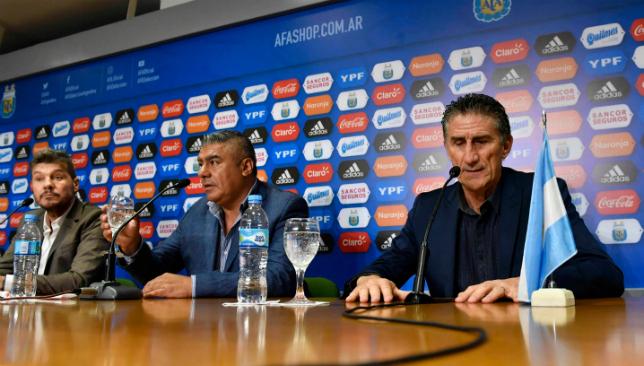
Edgardo Bauza was a saint. He’d performed a miracle. The jokes could stop. No longer could rival fans joke that the CSLA on their crest stood for Club Atletico sin Libertadores – in 2014 San Lorenzo finally became South American champions.
A 106-year wait came to an end just one year after their most famous supporter, Pope Francis, became the first man from the Americas to hold office at the Vatican. A delegation from the club headed straight to Rome to present him the trophy.
And it was Bauza who had led one of Argentina’s most storied clubs into the light, following up his 2008 success with Ecuador’s LDU Quito to become the first coach to win South America’s Champions League with clubs from different countries.
Just two years previously, San Lorenzo had been hamstrung by mismanagement and crippled by debt, with even Argentina’s convoluted relegation system (calculated on an average-points total over three years) which is heavily weighted in favour of the big clubs couldn’t prevent them from needing a play-off to avoid relegation.
Bauza did it, he said, by adding balance to a side that had raced its way to Argentina’s 19-match league title in 2013 under former coach Juan Antonio Pizzi. “The team had won the Argentinian league by playing a very attack-minded game, with everyone pushing forward. We had a lot of firepower up front but were weak at the back,” Bauza told FIFA.com.
That San Lorenzo side weren’t one for the ages, but they were certainly the best team on the continent that year; as were LDU in 2008, who played with tempo and took full advantage of the altitude of Quito, which saw Bauza named South American Coach of the Year.
His two major successes had arrived via a measured approach, by taking a step back to assess what he was working with before deciding how to move forward, which is also how his playing career began.
A fine midfielder in his adolescence, Bauza’s break came at a mass trial held by Rosario Central for hundreds of hopefuls in his province of Santa Fe. When the coaches asked the kids where they played, the overwhelming majority were midfielders or forwards.
To stand out, Bauza claimed he was a centre-back. He went on to played more than 300 league games for Central, hitting over 100 goals to leave him one of the most prolific stoppers in the game’s history. Nicknamed El Paton (Big Foot), Bauza was an imposing defender who stood over 6 ft 2 in and struggled to find boots to fit.
أول تصريح لـ #باوزا بعد وصوله إلى الإمارات لتدريب منتخبنا#المنصة pic.twitter.com/kTXT78g4vJ
— قناة دبي الرياضية (@dubaisportstv) May 9, 2017
His coaching career also began with Central and took him to Peru, and to Riyadh with Al Nassr in 2009, before his saintly success at San Lorenzo led him to Sao Paulo in 2014. Brazil provided the biggest stage of his career up to that point, but also the greatest task.
Sao Paulo were a shadow of the club that had won national, continental and international titles a decade previously, plagued by financial and institutional problems, they’d just lost a host of stars including Alexandre Pato to Chelsea and club legend Rogerio Ceni to retirement. Bauza’s pragmatic approach led them all the way to semi-finals of the Libertadores, and led Bauza to the Argentina job in August 2016.
He inherited a mess, however. The Argentinian Football Association (AFA) was in a state of chaos, a FIFA normalisation committee having been drafted in to remedy the endless institutional own goals that led to Lionel Messi’s brief international retirement in 2016.
Three defeats in major international finals in three years had morale at rock bottom and the relationship between the local press and players deteriorated to such an extent that Messi led the entire squad out to a press conference to announce a media blackout just three months after Bauza’s arrival.
It would be a baptism of fire that would see him Bauza from saint to sinner. He had no friendlies and very little time to work with his players, and frequently found himself without Messi.
The Barcelona man was available for just four of Bauza’s eight games in charge – Argentina won three of them. They would be the only three Bauza would win and, after a very fortunate 1-0 victory over Chile was followed up by a 2-0 defeat to Bolivia in March, he was sacked.
He had failed to implement a style of play or settle on his preferred personnel. With four matches remaining, Argentina sit outside South America’s automatic qualification slots for World Cup 2018. He lasted less than a year.
The UAE, then, offers a former saint the chance of a resurrection. And he knows the landscape.
“I know the football of that area because I worked four months in Saudi Arabia,” he told ESPN Argentina. “It’s not the Emirates but I know the nature of the players.”